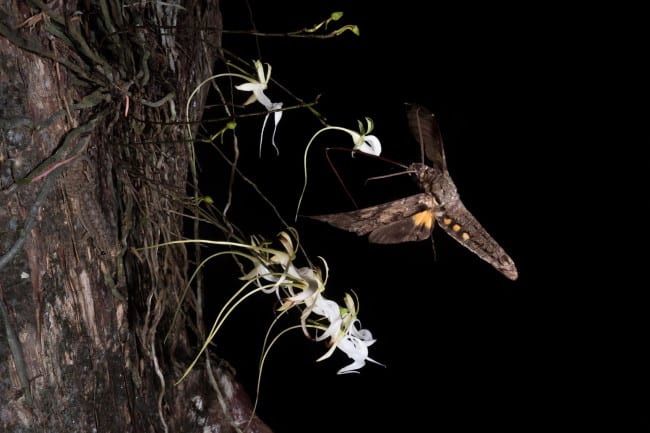Planet Earth Clinging to survival in shrinking swamps, ghost orchids are so elusive that their pollinators have remained unknown—until now. A giant sphinx moth extends its proboscis to drink the nectar from a ghost orchid. (Credit: Mac Stone) Admittedly, there are few circumstances in which a swamp buggy feels like the best choice of vehicle, but on this particular excursion to see one of the rarest orchids on the planet, our monster-truck-sized tires seem comically out of place. Trundling along a dusty, double-track road, we pass through open meadows and airy stands of slash pine ( Pinus elliottii ) and saw palmetto ( Serenoa repens ). The faint breeze the vehicle stirs up is so hot and dry, I half expect the straw-yellow grasses along our route to burst into flame. With every few hundred feet of forward progress, though, we drop an imperceptible inch or two in elevation, moving from the relative highlands of the pine flatwoods toward what some here call “the Grand Canyon of the Everglades:” the Fakahatchee Strand. This 38-kilometer-long (24-mile) stretch of densely forested wetland is one of the lowest points in Florida—albeit by only a few feet—and, as a result, carries much of the fresh water that flows in a slow, meandering path from swamps up north to the state’s southern tip. At least it used to. A Florida black bear wades through a cypress swamp on a cattle ranch immediately north of Big Cypress National Preserve. (Credit: Carlton Ward Jr.) To its proponents, for whom the word “swamp” is no more a pejorative than forest or meadow, the Fakahatchee Strand is not simply a conduit—or, worse, land that is valuable only if drained and developed. It’s a special place, home not just to panthers and bears and river otters, but also to one of the rarest and most famous plants in the world: the ghost orchid ( Dendrophylax lindenii ). The Fakahatchee is also largely unknown and underappreciated by people in this state and beyond, says photographer Carlton Ward Jr., 43, an eighth-generation Floridian who has made this trek dozens of times […]






